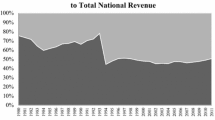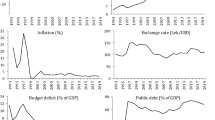Abstract
What political factors drive fiscal behavior in Latin America’s persidential democracies? This work seeks to identify the political determinants of the level of public spending and the primary balance of ten democratic regimes in Latin America between 1980 and 1998. We consider, besides the influence of traditional variables such as the government’s ideological orientation and electoral cycle, the impact of other institutional and political aspects, such as the legislative strength of the president, ministerial stability, and the degree of centralization of budget institutions. Methodologically, the work is based on a pooled cross-section-time-series data analysis of 132 observations. Our main findings are that presidents supported by a strong party and leading a stable team of ministers—and ones more to the right on the political spectrum—had a negative impact on public spending and a positive effect on fiscal balance, and that the electoral cycle deteriorates the latter.
Similar content being viewed by others
References
Aguayo Quezada, Sergio. 2000.El Almanaque Mexicano. México: Editorial Grijalbo.
Alcántara Sáez, Manuel and Flavia Freidenberg. 2001.Partidos Políticos de América Latina, 3 vols. Salamanca: Ediciones Universidad de Salamanca.
Alesina, Alberto. 1987. “Macroeconomic Policy in a Two-Party System as a Repeated Game.”Quarterly Journal of Economics 102: 651–678.
Alesina, Alberto and Howard Rosenthal. 1995.Partisan Politics, Divided Government, and the Economy. Cambridge: Cambridge University Press.
Alesina, Alberto, Nouriel Roubini, and Gerald Cohen. 1997.Political Cycles and the Macroeconomy. Cambridge: The MIT Press.
Alesina, Alberto, Ricardo Hausmann, Rudolf Hommes, and Ernesto Stein. 1999. “Budget Institutions and Fiscal Performance in Latin America.”Journal of Development Economics 59: 253–273.
Alesina, Alberto and Roberto Peroti. 1995. “Fiscal Expansions and Adjustments in OECD Countries.”Economic Policy 21: 205–248.
Alt, James and Robert Lowry. 1994. “Divided Government, Fiscal Institutions and Budget Deficits: Evidence from the States,”American Political Science Review 88: 811–829.
Altman, David. 2001.The Politics of Coalition Formation and Survival in Multiparty Presidential Regimes. Unpublished Ph.D. dissertation, University of Notre Dame.
Alvarez, R. Michael, Geoffrey Garret, and Peter Lange. 1991. “Government Partisanship, Labor Organization and Macroeconomic Performance.”American Political Science Review 85: 541–556.
Ames, Barry. 1987.Political Survival: Politicians and Public Policy in Latin America. Berkeley: University of California Press.
Amorim Neto, Octavio. 1998.Of Presidents, Parties and Ministers: Cabinet Formation and Legislative Decision-Making Under Separation of Powers. Unpublished Ph.D. dissertation, University of California at San Diego.
Baldez, Lisa and John M. Carey. 1999. “Presidential Agenda Control and Spending Policy: Lessons from General Pinochet’s Consitution.”American Journal of Political Science 43: 29–55.
Bank, Arthur S. and Thomas C. Muller. 1998.Political Handbook of the World. Binghamton: CSA Publications.
Bawn, Kathy and Frances Rosenbluth. 2003. “Coalition Parties versus Coalition of Parties: How Electoral Agency Shapes the Political Logic of Costs and Benefits.” Unpublished manuscript, UCLA.
Beck, Nathaniel. 2001. “Time-Series-Cross-Section Data: What Have We Learned in the Past Few Years?”Annual Review of Political Science 4: 271–293.
Beck, Nathaniel and Jonathan N. Katz. 1995. “What To Do (and Not To Do) with Time-Series—Cross-Section Data.”American Political Science Review 89: 634–647.
Blais, André, Donald Blake, and Stéphane Dion. 1993. “Do Parties Make a Difference? Parties and the Size of Government in Liberal Democracies.”American Journal of Political Science 37: 40–62.
Blanco Bugand, Josefina, et al. 1991.Los Gabinetes Ministeriales Como Elites Políticas—Colombia (1930–1990), vol. 2. Bogotá: Universidad Javeriana.
Borsani, Hugo. 2003.Eleições e Economia: Instituições Políticas e Resultados Macroeconômicos na América Latina (1979–1998). Belo Horizonte: Editora UFMG.
Braun, Miguel and Luciano di Gresia. 2003. “Towards Effective Social Insurance in Latin America.” Paper prepared for the Annual Meetings of the Inter-American Development Bank and Inter-American Investment Corporation, Milan, 23 March.
Carey, John M. 2002. “Getting their Way, or Getting in the Way? Presidents and Party Unity in Legislative Voting.” Paper presented at the annual meeting of the American Political Science Association.
CEPAL. 1998.El Pacto Fiscal: Fortalezas, Debilidades, Desafíos. Santiago: CEPAL.
Cheibub, José Antônio. 2002 “Minority Governments, Deadlock Situations, and the Survival of Presidential Democracies.”Comparative Political Studies 35: 284–312.
Cheibub, José Antônio and Fernando Limongi. 2002. “Democratic Institutions and Regime Survival: Parliamentary and Presidential Democracies Reconsidered.”Annual Review of Political Science 5: 151–179.
Coppedge, Michael. 1997. “A Classification of Latin American Political Parties.” Kellog Institute Working Paper #244, University of Notre Dame.
Deheza, Frace I. 1997. Gobiernos de Coalición en el Sistema Presidencial: Presidencial: América del Sur. Unpublished Ph.D. dissertation European University Institute. Florence.
Frieden, Jeffrey, Piero Ghezzi, and Ernesto Stein. 2001. “Politics and Exchange Rates: A Cross-Country Study.” InThe Currency Game: Exchange Rate Politics in Latin America, eds. Jeffrey Frieden, Piero Ghezzi and Ernesto Stein New York: IADB.
Fukasaku, K., and Luiz R. de Mello Jr. 1999.Fiscal Decentralization in Emerging Economies: Governance Issues. Brasília: Development Center Seminars—OECD.
Garrett, Geoffrey. 1998.Partisan Politics in the Global Economy. Cambridge: Cambridge University Press.
Gavin, Michael and Roberto Perotti. 1997. “Fiscal Policy in Latin America.” InNBER Macroeconomic Annual. Cambridge: MIT Press.
Gonzales Diaz, Andres. 1982.Ministros del Siglo XX. Bogotá: Imprenta Nacional.
Hallerberg Mark, Rolf Strauch, and Jürgen von Hagen. 2001. “The Use and Effectiveness of Budgetary Rules and Norms in EU Member States.” Report prepared for the Finance Ministry of Holland. Bonn: Center for European Integration Studies.
Hibbs, Douglas. 1977. “Political Parties and Macroeconomic Policy.”American Political Science Review 71: 1467–1487.
Huber, John D. 1998. “How Does Cabinet Instability Affect Political Performance? Portfolio Volatility and Health Care Cost Containment in Parliamentary Democracies.”American Political Science Review 92: 577–591.
Jones, Mark P., Pablo Sanguinetti, and Mariano Tommasi. 1999. “Politics, Institutions, and Public-Sector Spending in the Argentine Provinces,” InFiscal Institutions and Fiscal Performance, eds. James Poterba and Jurgen von Hagen. Chicago: The University of Chicago Press.
Kontopoulos, Yianos and Roberto Perotti. 1999. “Government Fragmentation and Fiscal Policy Outcomes: Evidence from OECD Countries.” InFiscal Institutions and Fiscal Performance, eds. James Poterba and Jurgen von Hagen. Chicago: The University of Chicago Press.
Kraemer, Moritz. 1997. “Electoral Budget Cycles in Latin America and the Caribbean: Incidence, Causes, and Political Futility.” Working Paper Series #354, Office of the Chief Economist, Inter-American Development Bank.
Laver, Michael and Kenneth A. Shepsle. 1996.Making and Breaking Governments: Cabinets and Legislatures in Parliamentary Democracies. Cambridge: Cambridge University Press.
Lijphart Arend. 1991. “Constitutional Choices for New Democracies.”Journal of Democracy 2: 72–84.
Mainwaring, Scott, Daniel Brinks, and Aníbal Pérez-Liñán. 2001. “Classifying Political Regimes in Latin America, 1945–1999.”Studies in Comparative International Development 36: 37–65.
Mainwaring, Scott and Timothy R. Scully. 1995.Building Democratic Institutions: Party Systems in Latin America. Stanford: Stanford University Press.
Mainwaring, Scott and Matthew S. Shugart. 1997. “Presidentialism and Democracy in Latin America: Rethinking the Terms of the Debate.” InPresidentialism and Democracy in Latin America, eds. Scott Mainwaring and Matthew S. Shugart. Cambridge: Cambridge University Press.
Mejía Acosta, Andrés and Michael Coppedge. 2001. “Political Determinants of Fiscal Discipline in Latin América, 1979–1998.” Paper presented at the XXIII International Congress of the Latin American Studied Association, Washington, D.C., 5–8 September.
Mesa Gisbert, Carlos D. 1990.Presidentes de Bolivia: Entre Urnas y Fusiles. La Paz: Editorial Gisbert y Cia.
Molinelli, Guillermo N., M. Valeria Palanza, and Gisela Sin. 1999.Congreso, Presidencia y Justicia en Argentina. Buenos Aires: Temas Grupo Editorial SRL.
Mueller, Dennis C. 2003.Public Choice III. New York: Cambridge University Press.
Mukherjee, Bumba, “Political Parties and the Size of Government in Multiparty Legislatures: Examining Cross-Country and Panel Data Evidence.”Comparative Political Studies 36: 699–728.
Murillo, María Victoria. 2001.Labor Unions, Partisan Coalitions, and Market Reforms in Latin American. New York: Cambridge University Press.
Murillo, María Victoria. 2003. “Latin American Labor.” InConstructing Democratic Governance in Latin America. 2nd ed., eds. Jorge I. Dominguez and Michael, Shifter. Baltimore: The Johns Hopkins University Press.
Nohlen, Dieter. 1993.Enciclopedia Electoral Latinoamericana y del Caribe San José: Instituto Interamericano de Derechos Humanos.
Olmos, Helena. N.d.Ministros de la Democracia. Caracas: Instituto Autonomo Biblioteca Nacional—Colección de Publicacions Oficiales.
Proyecto Gobernabilidad CORDES. 2002.Miembros del Gabinete 1979–2002. Quito: CORDES.
Prud’homme, Remy. 1995. “On the Dangers of Decentralization.”The World Bank Research Observer.
Roubini, Nouriel, 1991. “Economic and Political Determinants of Budget Deficits in Developing Countries.”Journal of International Money and Finance 10: S49-S72.
Roubini, Nouriel and Jeffrey Sachs. 1989. “Political and Economic Determinants of Budget Deficits in the Industrial Democracies.”European Economic Review 33: 903–938.
Shah, Anwar. 1998. “Fiscal Federalism and Macroeconomic Governance: For Better or Worse?”World Bank Discussion Papers.
Shugart, Matthew S., and John M. Carey. 1992.Presidents and Assemblies: Constitutional Design and Electoral Dynamics. Cambridge: Cambridge University Press.
Spiller, Pablo T. and Mariano Tommasi. 2003. “The Institutional Foundations of Public Policy: A Transactions Approach to Argentina.”Journal of Law, Economics, & Organization 19: 281–306.
Stein, Ernesto. 1999. “Fiscal Decentralization and Government Size in Latin America.”Journal of Applied Economics 2: 357–391.
Stein, Ernesto, Ernesto Talvi, and Alejandro Grisanti. 1999. “Institutional Arrangements and Fiscal Performance: The Latin American Experience.” InFiscal Institutions and Fiscal Performance, eds. James Poterba and Jurgen von Hagen. Chicago: The University of Chicago Press.
Ter-Minassian, Teresa. 1997. “Intergovernmental Fiscal Relations in a Macroeconomic, Perspective: An Overview.” InFiscal Federalism in Theory and Practice. ed., Teresa-Ter-Minassian. Washington, D.C.: IMF.
Tuesta Soldevilla, Fernando. 1994.Perú Político en Cifras. Lima: Fundación Friedrich Ebert.
Wibbels, Erik. 2000. “Federalism and the Politics of Macroeconomic Policy and Performance”American Journal of Political Science 44: 687–702.
Additional information
Octavio Amorim Neto is assistant professor of political science at the Graduate School of Economics at the Getulio Vargas Foundation in Rio de Janeiro. His work has appeared in such journals asWorld Politics, Legislative Studies Quarterly, Latin American Politics and Society, Party Politics, andAmerican Journal of Political Science. Professor Amorim Neto is currently writing a book on cabinet formation and its policy consequences in presidential regimes.
Hugo Borsani is associate professor of political science at the Universidade Estadual do Norte Fluminense at Campos, Brazil. He is the author ofEleições e Economia: Instituições Políticas e Resultados Macroeconômicos na América Latina (1979–1998) (Belo Horizonte: Editors UFMG, 2003).
An earlier version of this paper was presented at the fifth meeting of the Political Economy Group of LACEA, Cartagena, Colombia, 25–26 September 2003, and at the Economics Department at the University of São Paulo, 16 October 2003. We would like to acknowledge the financial support provided by IPEA, the think tank of Brazil’s Planning Ministry, under grants 2001/ 004396 and 2001/004397. We also wish to thank George Avelino, Luiz Carlos Bresser Pereira, Fabio Giambiagi, Roberto Junguito, Andrés Mejía Acosta, Eustáquio Reis, Paulo Tafner, Mario Cristina T. Terra, and two anonymous reviewers for their comments on previous versions of the paper. The usual disclaimer applies. Juliana Estrella, Rodrigo R. A. Pinto, and Daniela Ribeiro provided an invaluable contribution as research assistants.
Rights and permissions
About this article
Cite this article
Neto, O.A., Borsani, H. Presidents and cabinets: The political determinants of fiscal behavior in Latin America. St Comp Int Dev 39, 3–27 (2004). https://doi.org/10.1007/BF02686313
Issue Date:
DOI: https://doi.org/10.1007/BF02686313




